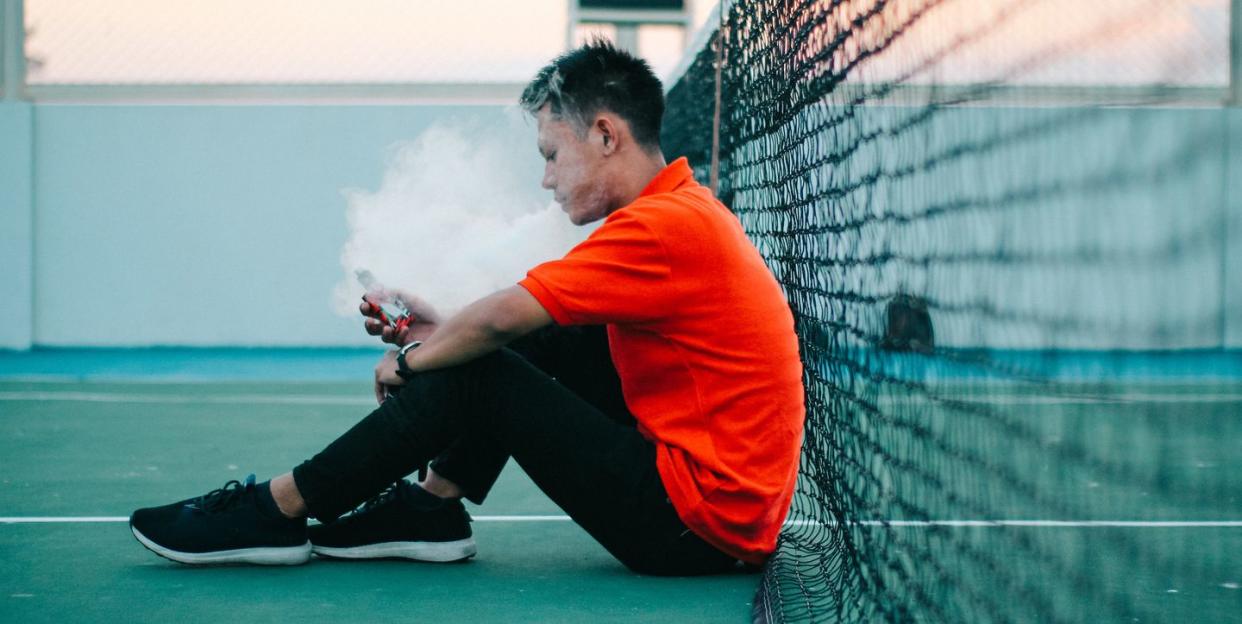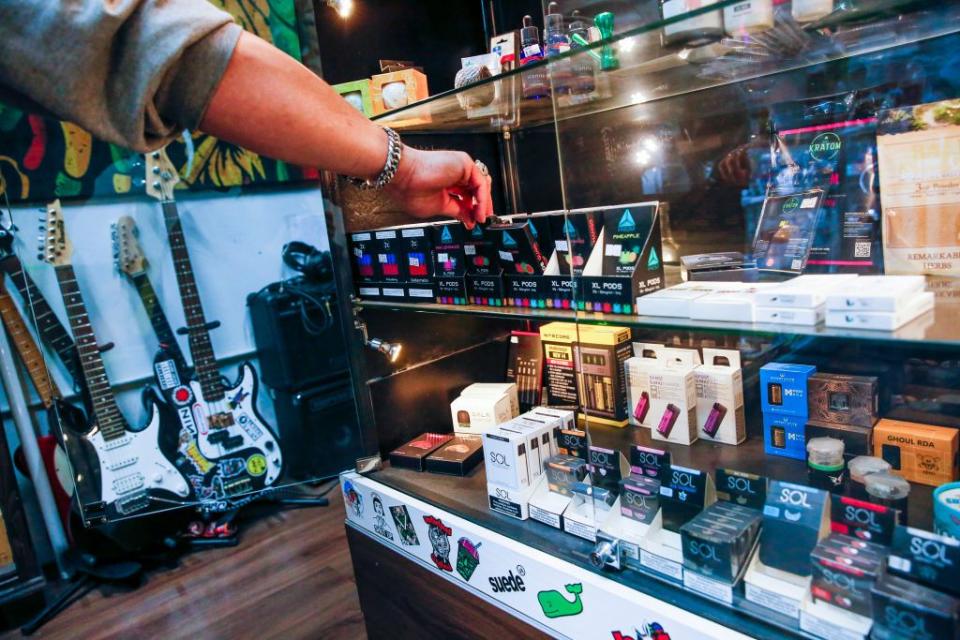It's Vape Ban Day in America. Here's What Will Change— and What Won't.

It's Vape Ban Day. Welcome. Around the country, vapers and parents and teens and politicians and people trying to quit cigarettes are wondering: What does this mean? You could not be blamed for being confused as all hell.
In the last year, we've been yanked back and forth and sideways on the status of vaping. The CDC started counting up vaping-related illnesses and deaths while Juul closed up its flavored pod shop (it's still selling menthol and tobacco pods, though). Apple banned vaping-related apps from the App Store, and Congress raised the legal age to buy tobacco to 21. Some cities and states enacted their own bans but then saw them chopped down in the courts. Vape proponents still claim nicotine pods helped them quit smoking tobacco-filled cigarettes.
Most recently, the influx of vaping-related illness and deaths has seemed to slow, and the CDC's investigations point to bootleg THC pods as the primary concern. And President Trump went from a hard anti-flavored vape stance to a soft, I-have-been-talked-down-by-lobbyists-and-campaign-advisors stance. It's Trump's national "flavor ban" that's going into effect on this fair Thursday. Here's what it means.
What exactly is banned?
When the FDA announced its plan to ban at the beginning of the year, it emphasized that it wasn't actually a "ban." And that's half-true—the ban is toothless compared to what Trump originally wanted, and what public health advocates and parents demanded. It only covers the manufacturing, distribution, and sale of fruit- and mint-flavored vape products, with the exception of less appealing flavors like menthol and tobacco. And it only covers flavored vape cartridges, or pods. That means flavored e-liquid that's not packaged in a cartridge is good to go, as are disposable vapes and refillable open-tank vapes. It's still a ban, though.
A prime example of a flavored vape product that would have been banned is Juul's ridiculously popular mango pods, except that Juul had already pulled all of its mint- and fruit-flavored products from stores and online late in 2019 after the public collectively blamed it for the vaping scare.

How will the vape ban go into effect?
Ostensibly, the FDA would very much appreciate it if all vape shops collectively stopped selling flavored vape pods right this instant in a national show of solidarity. The FDA also recognizes this is a longshot outcome. In an email to CNN, an FDA spokesperson acknowledged that "the public may continue to see some of the types of products outlined in the [FDA's] priorities on the market as the agency works to hold manufacturers and retailers—both in brick-and-mortar stores and online—accountable."
In the meantime, all flavored vape products will have to be submitted to the FDA for evaluation by May 12. If the FDA approves of how a company's flavored pods are being made and marketed—i.e. they aren't making any wild claims about being "healthy" or targeting kids—then they could be approved for sale again. The deadline for companies whose products don't fall under the current flavor ban is also May 12. If they don't submit an application for approval by then, the FDA will start to "prioritize enforcement" of their products, meaning they too could be banned from retail spaces. However, if they do submit an application, then the FDA says it will hold off on enforcing anything for a year.
So when will the vape ban really matter?
If you vape flavored pods, then right now—or as soon as the FDA cracks down on the retailer that sells your flavored pods. If you vape menthol or tobacco products, or if you vape flavored juice from open-tank systems, and your vape company of choice doesn't submit an application to the FDA by May 12, then May 12. If your vape company of choice has submitted an application by May 12, then you have a yearlong grace period (or up to the point that the FDA makes a ruling). CNN says that a good number of vape companies will cooperate with the FDA. There are a lot of moving pieces. And this is all assuming the state you live in doesn't enforce its own ban.
What are the reactions like?
Is anyone happy about this thing? Short answer: No. NBC reports that anti-tobacco and anti-vaping organizations think the flavor ban won't do squat to get teens to kick their nicotine usage. Vape shop owners fear they'll be shut down, if they haven't shut down already, without FDA-approved products to sell. According to a New York magazine report on the state of vaping in America, the internet has deemed May 12 to be an impending "vaping apocalypse." (A “vapocalypse,” clearly.) In mid-January, Trump bemoaned, "I should never have done that fucking vaping thing." What a mess.
How are people (teens) getting around it?
Last fall, after the CDC started reporting the first signs of vaping-related illnesses, American teens took to Twitter, TikTok, and Instagram to mass-quit Juuling, which was sort of a joke but not really. The thing about teens is that they're smart. They grew up in this digital age of scam and grift and hustle. They will find another vape-based source of nicotine if they are addicted to nicotine. So will adults. It might be as simple as switching to menthol or tobacco pod flavors. The New York Times reports that teens are also using disposable, nonrefillable vapes, which come in all kinds of fun, fruity flavors and aren't covered by the flavor ban.
The national vaping crisis, as it's been dubbed, will play out over months and years as vape companies seek FDA approval, vape usage is studied more by scientists, and Big Nicotine squares off against public health advocates. But it's safe to assume that something some people love so much cannot possibly be all good for the human race. Life just doesn't work that way.
You Might Also Like

